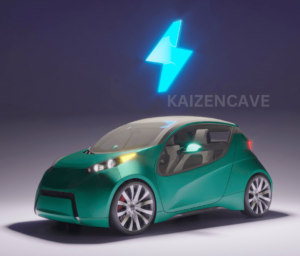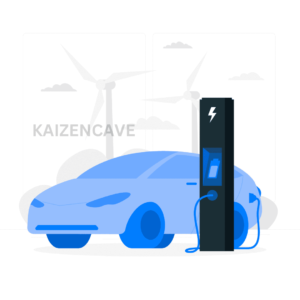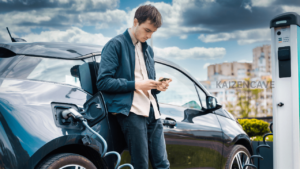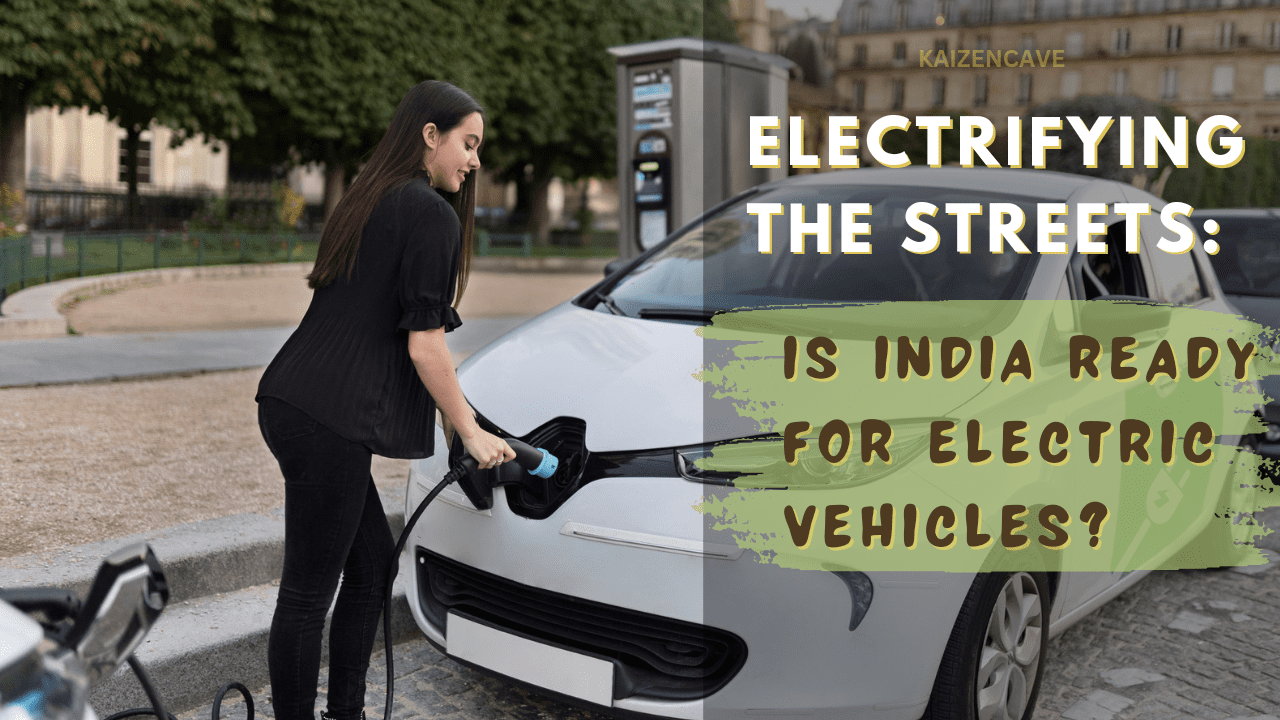Embracing the Electric Revolution
The world is witnessing a paradigm shift in transportation, with electric vehicles (EVs) emerging as the frontrunners in the race towards sustainable and cleaner mobility. As countries globally strive to reduce their carbon footprint, one pertinent question arises: Is India Ready for Electric Vehicles, the electric revolution and electrify its streets?
Is India Ready for Electric Vehicles?

In the bustling streets of India, traffic congestion is an everyday challenge. From metropolitan cities to small towns, the clogged roads contribute not only to increased commute times but also to the alarming levels of air pollution. The need for an eco-friendly alternative is more pressing than ever.
A Greener Tomorrow
The prospect of electrifying the streets heralds not just a mode of transportation but a revolution in the way society perceives and interacts with the environment. It is a collective responsibility, and by overcoming challenges and embracing sustainable practices, India is paving the way for a greener tomorrow.
Pollution Pangs: Impact on Public Health
The adverse effects of vehicular pollution on public health cannot be overstated. Respiratory issues, cardiovascular diseases, and other health complications are on the rise. Electric vehicles present a promising solution, with zero tailpipe emissions offering a breath of fresh air for India’s health-conscious population.
India’s Electric Odyssey
The journey towards a greener tomorrow is an evolving process, marked by challenges and triumphs. As the electric vehicle landscape transforms, India’s commitment to sustainability becomes a beacon for other nations to follow.
Government Initiatives
Recognizing the urgency of addressing environmental concerns, the Indian government has taken substantial strides in promoting electric vehicles.
Policy Support
Government policies, such as the Faster Adoption and Manufacturing of Hybrid and Electric Vehicles (FAME) scheme, aim to incentivize both manufacturers and consumers. This policy support includes subsidies, tax benefits, and other initiatives to spur the adoption of EVs.
Incentives for EV Adoption
To further sweeten the deal, financial incentives for consumers, including reduced registration fees and low-interest loans, have been introduced. These measures are designed to make electric vehicles more accessible and attractive to the masses.
Charging Stations Conundrum

However, the road to widespread electric vehicle adoption in India is not without its challenges.
Rural vs. Urban Divide: Accessibility Issues
While metropolitan areas may have a burgeoning network of charging stations, rural areas are often left out of the equation. The lack of charging infrastructure in remote locations poses a significant hurdle to the seamless integration of electric vehicles into the Indian landscape.
As the nation stands at the crossroads of technological transformation, the electric vehicle market is witnessing exponential growth.
Global Success Stories
Internationally, success stories like Tesla have demonstrated the potential of electric vehicles. Tesla’s impact extends beyond its innovative electric cars; it has become a symbol of breaking barriers and challenging the traditional norms of the automotive industry.
Tesla’s Impact: Breaking Barriers
Tesla’s entry into the Indian market could be a catalyst for change, inspiring local manufacturers to push the boundaries of innovation and challenge the status quo.
India’s Growing Electric Vehicle Market
Despite the challenges, India’s electric vehicle market is experiencing robust growth.
Leading Players
Established automakers and new startups alike are entering the electric vehicle space. Companies like Tata Motors, Mahindra Electric, and new players such as Ola Electric are contributing to the diversification of the market.
Technological Advancements: Batteries and Range
Technological advancements in battery technology are enhancing the range and efficiency of electric vehicles. Batteries that offer longer life, faster charging, and sustainable materials are becoming the norm, addressing concerns related to range anxiety.
Public Perception
Despite these advancements, there exists a degree of skepticism among the general public.
Breaking Stereotypes
Electric vehicles are often perceived as expensive and impractical. Breaking these stereotypes requires a concerted effort to educate consumers about the long-term economic and environmental benefits of electric vehicles.
Consumer Skepticism: Addressing Misconceptions
Addressing misconceptions, such as the high initial cost and limited range of electric vehicles, is crucial. Creating awareness about the evolving technology and debunking myths can contribute to changing public opinion.
Economic Impacts
The shift towards electric vehicles is not just an environmental imperative; it also holds economic promise.
Job Creation: Skills for the Future
The electric vehicle industry has the potential to create jobs across various sectors, from manufacturing to research and development. However, preparing the workforce with the necessary skills is imperative to harness this potential.
Economic Boost: Reducing Dependency on Oil Imports
Reducing dependency on oil imports for conventional vehicles can provide an economic boost. By investing in electric mobility, India can contribute to a more sustainable and self-reliant future.
Environmental Benefits
One of the most significant advantages of electric vehicles is their positive impact on the environment.
Reduced Carbon Footprint: Sustainable Transportation
Electric vehicles produce significantly fewer greenhouse gas emissions compared to their internal combustion counterparts. This reduction in the carbon footprint aligns with India’s commitment to sustainable transportation.
Green Energy Integration: Collaborative Efforts
Integrating electric vehicles with green energy sources, such as solar and wind power, presents an opportunity for collaborative efforts between the automotive and renewable energy industries.
Government Policies and Regulations
The success of the electric vehicle transition in India hinges on effective policies and regulations.
Future Roadmap: Stricter Emission Norms
A clear roadmap with stricter emission norms and deadlines for the phasing out of internal combustion engines is essential. Such regulations will provide a framework for manufacturers and incentivize the production of electric vehicles.
Challenges and Adaptations: Balancing Growth and Regulation
However, striking the right balance between fostering industry growth and imposing necessary regulations poses a challenge. The government must adapt its policies to the evolving dynamics of the electric vehicle market.
Industry Perspectives
Key players in the automotive industry play a pivotal role in shaping India’s electric vehicle future.
Automakers’ Role
Established automakers have the responsibility to invest in research and development, bringing cutting-edge electric vehicle models to the market. Their commitment to sustainability can set the tone for the entire industry.
EV Startups in India: Innovation and Challenges
The emergence of electric vehicle startups in India brings innovation to the forefront. However, these startups face challenges related to funding, infrastructure, and market penetration. Overcoming these hurdles is essential for a thriving electric vehicle ecosystem.
Advancements in Battery Technology
The heart of electric vehicles lies in their batteries.
Powering the Future
Advancements in battery technology are unlocking new possibilities for electric mobility. From longer ranges to faster charging times, these innovations are propelling the electric vehicle industry into the future.
Innovations in Battery Efficiency: Sustainable Materials
Exploring sustainable materials for batteries is a key focus area. Developing batteries with minimal environmental impact contributes to the overall sustainability of electric vehicles.
Social Impact

The transition to electric vehicles extends beyond technology; it influences societal behaviors and values.
Changing Lifestyles
Adopting electric vehicles can lead to a paradigm shift in lifestyles. Embracing a green mindset involves not just choosing electric vehicles but also promoting sustainable practices in other aspects of life.
Social Responsibility: Collective Environmental Consciousness
The concept of social responsibility becomes paramount. Encouraging a collective environmental consciousness is essential for ensuring the success of the electric vehicle movement.
Roadmap for the Future
The future of electric vehicles in India depends on collaborative efforts from various stakeholders.
Collaborative Efforts: Public-Private Partnerships
Public-private partnerships are crucial for building the necessary infrastructure, including charging stations and research facilities. Collaboration fosters an environment conducive to the growth of the electric vehicle industry.
Education and Awareness: Nurturing a Green Mindset
Education and awareness campaigns play a pivotal role in shaping public opinion. Nurturing a green mindset from an early age and providing accessible information can accelerate the acceptance of electric vehicles.
Conclusion
As India stands at the cusp of an electric revolution, the question of readiness is not just about technological advancements but also societal and regulatory adaptations. The transition to electric vehicles requires a concerted effort from the government, industry, and the public. By overcoming challenges and embracing sustainable practices, India can pave the way for a greener and cleaner tomorrow.

FAQs
How fast is the electric vehicle market growing in India?
The electric vehicle market in India is experiencing rapid growth, with increasing consumer interest and government initiatives driving adoption.
Are electric vehicles economically feasible for the average consumer?
While the initial cost of electric vehicles may be higher, the long-term economic benefits, including lower maintenance and operational costs, make them economically viable for many consumers.
What challenges do electric vehicle startups face in India?
Electric vehicle startups in India often face challenges related to funding, infrastructure, and market penetration. Overcoming these hurdles is crucial for their success.
How can the government encourage EV adoption in rural areas?
The government can encourage electric vehicle adoption in rural areas by investing in charging infrastructure, providing incentives, and raising awareness about the benefits of electric mobility.
What role do charging infrastructure and battery technology play in India’s electric vehicle future?
Charging infrastructure and battery technology are critical components for the success of electric vehicles in India. A robust charging network and advancements in battery efficiency are essential for widespread adoption.


You navigate through topics with such grace, it’s like watching a dance. Care to teach me a few steps?
Bookmarking this for future reference, because who knows when I’ll need a reminder of The wisdom?
This post has been incredibly helpful to me. The guidance is something I’m truly grateful for.